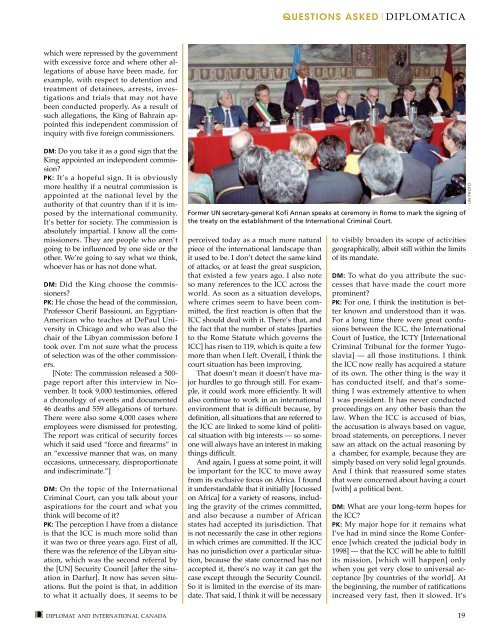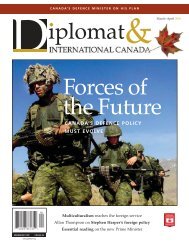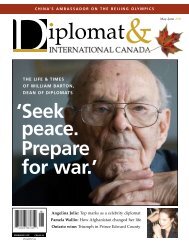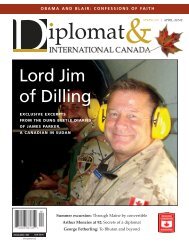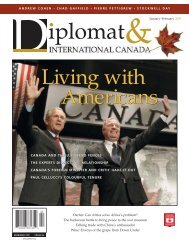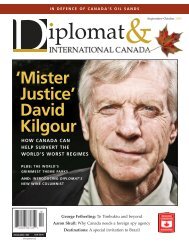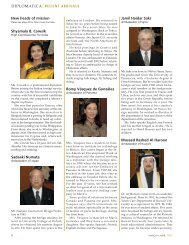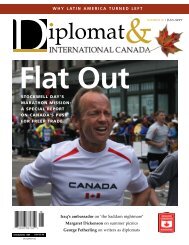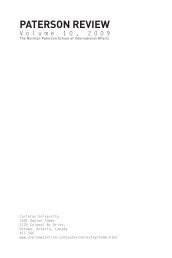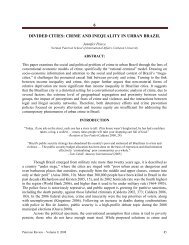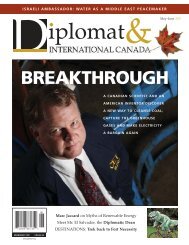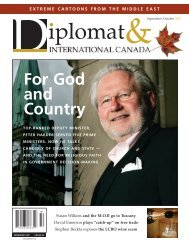John Baird: Canada's freedom agenda - Diplomat Magazine
John Baird: Canada's freedom agenda - Diplomat Magazine
John Baird: Canada's freedom agenda - Diplomat Magazine
You also want an ePaper? Increase the reach of your titles
YUMPU automatically turns print PDFs into web optimized ePapers that Google loves.
QUESTIONS Asked|DIPLOMATICAwhich were repressed by the governmentwith excessive force and where other allegationsof abuse have been made, forexample, with respect to detention andtreatment of detainees, arrests, investigationsand trials that may not havebeen conducted properly. As a result ofsuch allegations, the King of Bahrain appointedthis independent commission ofinquiry with five foreign commissioners.DM: Do you take it as a good sign that theKing appointed an independent commission?PK: It’s a hopeful sign. It is obviouslymore healthy if a neutral commission isappointed at the national level by theauthority of that country than if it is imposedby the international community.It’s better for society. The commission isabsolutely impartial. I know all the commissioners.They are people who aren’tgoing to be influenced by one side or theother. We’re going to say what we think,whoever has or has not done what.DM: Did the King choose the commissioners?PK: He chose the head of the commission,Professor Cherif Bassiouni, an Egyptian-American who teaches at DePaul Universityin Chicago and who was also thechair of the Libyan commission before Itook over. I’m not sure what the processof selection was of the other commissioners.[Note: The commission released a 500-page report after this interview in November.It took 9,000 testimonies, offereda chronology of events and documented46 deaths and 559 allegations of torture.There were also some 4,000 cases whereemployees were dismissed for protesting.The report was critical of security forceswhich it said used “force and firearms” inan “excessive manner that was, on manyoccasions, unnecessary, disproportionateand indiscriminate.”]DM: On the topic of the InternationalCriminal Court, can you talk about youraspirations for the court and what youthink will become of it?PK: The perception I have from a distanceis that the ICC is much more solid thanit was two or three years ago. First of all,there was the reference of the Libyan situation,which was the second referral bythe [UN] Security Council [after the situationin Darfur]. It now has seven situations.But the point is that, in additionto what it actually does, it seems to beFormer UN secretary-general Kofi Annan speaks at ceremony in Rome to mark the signing ofthe treaty on the establishment of the International Criminal Court.perceived today as a much more naturalpiece of the international landscape thanit used to be. I don’t detect the same kindof attacks, or at least the great suspicion,that existed a few years ago. I also noteso many references to the ICC across theworld. As soon as a situation develops,where crimes seem to have been committed,the first reaction is often that theICC should deal with it. There’s that, andthe fact that the number of states [partiesto the Rome Statute which governs theICC] has risen to 119, which is quite a fewmore than when I left. Overall, I think thecourt situation has been improving.That doesn’t mean it doesn’t have majorhurdles to go through still. For example,it could work more efficiently. It willalso continue to work in an internationalenvironment that is difficult because, bydefinition, all situations that are referred tothe ICC are linked to some kind of politicalsituation with big interests — so someonewill always have an interest in makingthings difficult.And again, I guess at some point, it willbe important for the ICC to move awayfrom its exclusive focus on Africa. I foundit understandable that it initially [focussedon Africa] for a variety of reasons, includingthe gravity of the crimes committed,and also because a number of Africanstates had accepted its jurisdiction. Thatis not necessarily the case in other regionsin which crimes are committed. If the ICChas no jurisdiction over a particular situation,because the state concerned has notaccepted it, there’s no way it can get thecase except through the Security Council.So it is limited in the exercise of its mandate.That said, I think it will be necessaryto visibly broaden its scope of activitiesgeographically, albeit still within the limitsof its mandate.DM: To what do you attribute the successesthat have made the court moreprominent?PK: For one, I think the institution is betterknown and understood than it was.For a long time there were great confusionsbetween the ICC, the InternationalCourt of Justice, the ICTY [InternationalCriminal Tribunal for the former Yugoslavia]— all those institutions. I thinkthe ICC now really has acquired a statureof its own. The other thing is the way ithas conducted itself, and that’s somethingI was extremely attentive to whenI was president. It has never conductedproceedings on any other basis than thelaw. When the ICC is accused of bias,the accusation is always based on vague,broad statements, on perceptions. I neversaw an attack on the actual reasoning bya chamber, for example, because they aresimply based on very solid legal grounds.And I think that reassured some statesthat were concerned about having a court[with] a political bent.DM: What are your long-term hopes forthe ICC?PK: My major hope for it remains whatI’ve had in mind since the Rome Conference[which created the judicial body in1998] — that the ICC will be able to fulfillits mission, [which will happen] onlywhen you get very close to universal acceptance[by countries of the world]. Atthe beginning, the number of ratificationsincreased very fast, then it slowed. It’sUN PHOTOdiplomat and international canada 19


